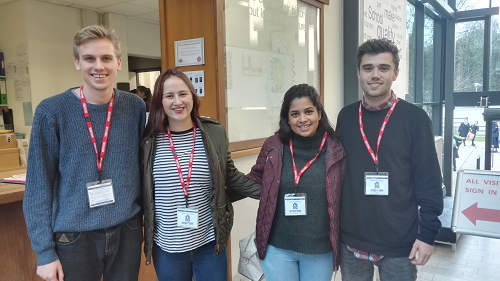When our lecturer Dr Devyani Prabhat presented the opportunity to take part in the widening participation programme connected with the British Citizenship and Immigration module of my law degree, I knew it would be an opportunity not to be missed.
Myself and four other students (pictured) delivered 11 sessions to secondary school students on children's citizenship and the use of discretion in immigration matters. Together, we reached about 330 children in local schools over February and March 2017.
I decided to take part in this programme for a number of reasons. I had previously enjoyed working for the University's Widening Participation department. It was also a perfect opportunity to put the knowledge that we had just learnt through our Immigration tutorials into practice.
Having to tailor information into interesting exercises for 15 year-olds required a deeper level of understanding in order to process what we had learnt and then separate this into the key themes to make sure that we were giving the children the necessary information to take away from the session.
The skills that I have developed from teaching these sessions have already proved helpful with structuring information for coursework titles and exam revision. Another key skill that the widening participation project has allowed me to develop is my own adaptability to changing circumstances.
A few times we were faced with changing class sizes, or technology glitches, which meant that we had to adapt what we had planned for the lesson and think on our feet. Having to change plans and deliver the information in modified formats, while, still having to remain calm and collected in front of the students, taught me invaluable skills; skills that I know are going to be crucial when I move in to the work place.
Taking ownership of my own learning and the learning of others in this respect, made me feel more connected to the law school as a whole. I have greater appreciation for all the teachers/lecturers that have taught me up until this point. I also found seeing the secondary school students engaging with the law-making process and developing their own opinions and thoughts on the real life factual scenarios they were faced with, the most rewarding aspect of teaching.
At the start of every session we would be faced with puzzled faces when announcing that we were going to be delivering a session on immigration law. Most of the students had convinced themselves that they knew nothing about this law, or indeed any law, but, by the end of the session they would realise that indeed they knew a lot more then they had thought possible. They held strong opinions on issues that they seemed nonchalant about just 50 minutes before! This change was amazing to see and made us feel like we were actually making an impact through teaching.
The feedback we received from the students was very enjoyable. They realised law was a lot more accessible then they had thought before. They were quite positive about choices they would make regarding university, such as even considering studying law in university.
